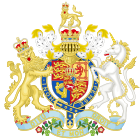Parliamentary Elections (Ireland) Act 1829 facts for kids
| Act of Parliament | |

|
|
| Long title | An Act to amend certain Acts of the Parliament of Ireland relative to the Election of Members to serve in Parliament, and to regulate the Qualification of Persons entitled to vote at the Election of Knights of the Shire in Ireland. |
|---|---|
| Citation | 10 Geo. 4. c. 8 |
Quick facts for kids Dates |
|
| Royal assent | 13 April 1829 |
| Text of statute as originally enacted | |
The Parliamentary Elections (Ireland) Act 1829 was a law passed in 1829. It is also known as the Irish Franchise Act 1829. This law changed who could vote for Members of Parliament in Ireland. These MPs were called "knights of the shire."
The Act made it harder for many people to vote. It was passed by the Parliament of the United Kingdom.
Contents
What Did the Act Change?
This law changed the rules for voting in Irish counties. Before this Act, many people could vote if they owned land worth 40 shillings. These voters were called "forty-shilling freeholders."
The new law said you needed to own land worth at least £10 to vote. This meant that many people who used to vote could no longer do so. The Act took away their right to vote.
Why Was This Law Passed?
The Parliamentary Elections (Ireland) Act was passed on the same day as another important law. This was the Roman Catholic Relief Act 1829. That law allowed Catholics to become Members of Parliament.
To balance this, the government wanted to reduce the number of voters in Ireland. They especially wanted to limit the power of some Catholic voters.
How Did the Act Affect Voting?
The changes made by this Act had a big impact. The number of people who could vote in Ireland dropped a lot.
- Before the Act, about 215,000 people could vote.
- After the Act, only about 40,000 people could vote.
This was a huge decrease in the number of voters.
Later Changes to Voting Rights
The voting rules changed again a few years later. The Representation of the People (Ireland) Act 1832 was passed in 1832. This new law increased the number of voters in Ireland.
After the 1832 Act, about 60,500 people could vote. This was still much less than before 1829. However, it was an increase from the low number after the 1829 Act.

